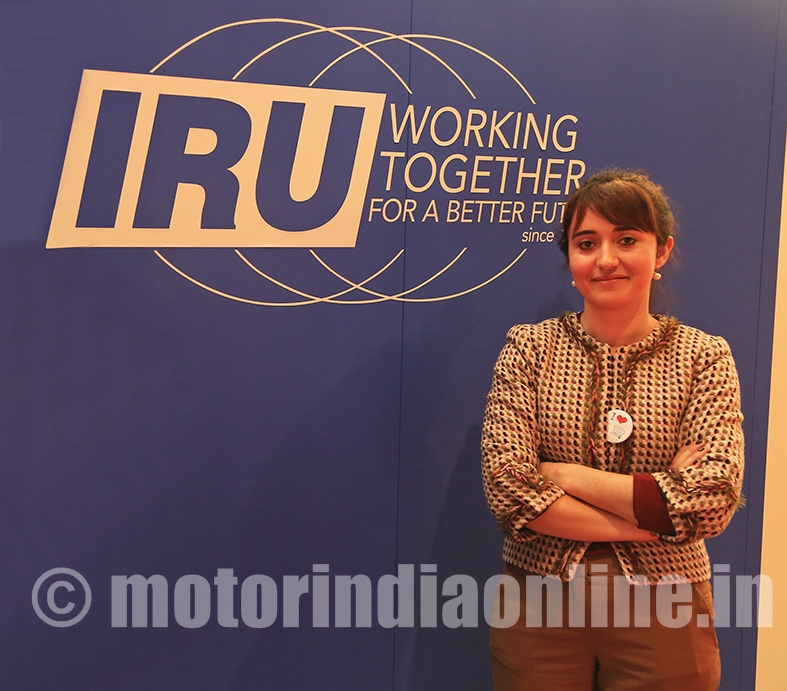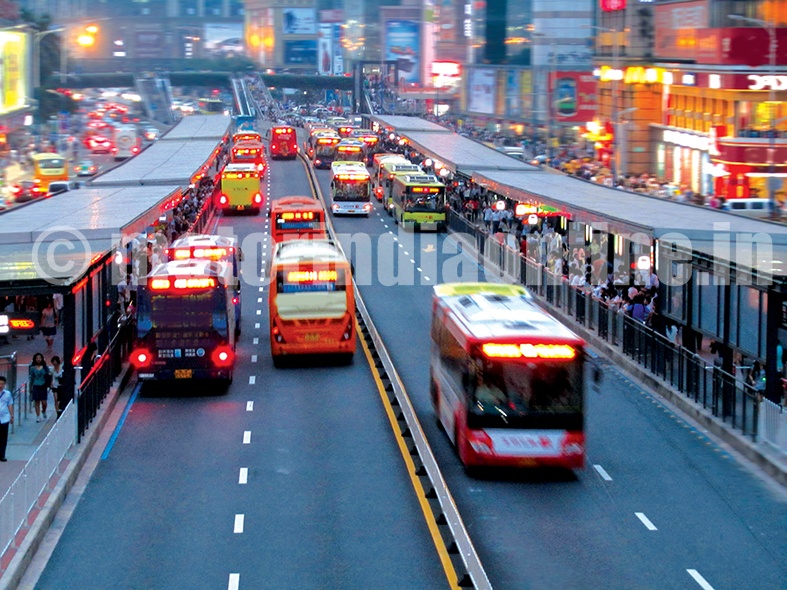Indian cities are currently overwhelmed by growing urban population, massive motorisation and reduced share of public transport, thus leading to severe congestion on roads, deteriorating air quality and road fatalities. Collective passenger transport, including buses, coaches and taxis, is the closest complement, competitor and substitute of the private car.
The work of the High Level Group on smart urban mobility will form part of a clear action plan on safe, green, affordable and sustainable transport in India with clear policy recommendations on how to substantially increase the use of buses, coaches and taxis by 2030.
Read on for excerpts from an exclusive interview with Ms. Sonila Metushi, Manager – Mobility of People & Taxis, IRU, on the activities of IRU in India:

We see an increasing level of activity and engagement from IRU in India – Smart Move High Level Group, Smart Urban Mobility Report, High Level Workshop and more. What is IRU’s presence in India currently and how do you wish to move ahead from here?
IRU is the global industry association for road transport, driving the sustainable mobility of people and goods across the planet. Together with our Indian member associations, the All India Transporters Welfare Association (AITWA) and the Association of State Road Transport Undertakings (ASRTU), we move goods, we move people and we get India where it needs to be.
IRU believes in mobility that supports economies, jobs, security, the environment and communities. We believe in transport networks that are safe, accessible, rapid, efficient and adaptable, reasonably priced, innovative and interconnected. We believe in transport markets that are fair, well-regulated and non-discriminatory to different modes or users.
In partnership with UN-Habitat, we have launched the All India Smart Move High Level Group, which aims to substantially increase the use of collective passenger transport and create a wide-ranging vision for passenger transport in India by bringing together representatives from private businesses, associations and other stakeholders from civil society.
What are IRU’s top three priorities as far as the Indian market is concerned?
Focusing on smart urban mobility including taxis, regular intercity coach services and coach-based tourism, the IRU-initiated All-India Smart Move High Level Group is working towards a joint vision on the role of buses, coaches and taxis, while developing policy and business recommendations to substantially increase passenger numbers, and share best practices. It’s important that Indian solutions are found to address the unique challenges of India’s future transport needs.
Together with our partners, our objective is to further the drive to improve service and safety standards, bringing better bus, coach and taxi services to the people of India. The IRU-initiated High Level Group is currently producing specific recommendations on intermediate public transport, electromobility, as well as intercity and interstate scheduled bus and coach lines. Our aim is to work out a joint vision for the creation of a sustainable transport system for India’s future.
India being the world’s second most populous country and also the second largest bus market globally. How important a market is it for IRU from a global standpoint?
The latest IRU Road Transport Indices show that India is forging ahead in terms of economic growth as a result of its understanding that systemic innovation and investment in efficient road transport are instrumental in driving economic growth.
The next step now is to build on this success with a fundamental transformation of the Indian transport system, while answering the challenges posed by the future of mobility in India with pollution, congestion and safety being among the most pressing challenges.
What do you think the various key stakeholders in the Indian context should do to improve the standard of public transportation in India?
Mobility is both a key contributor to building up a dynamic and inclusive society and a societal challenge. The expected increase in demand for mobility in the coming decades risks further aggravating problems such as pollution, congestion and CO2 emissions and pose a challenge in terms of sustainability. This challenge can only be met by a fundamental transformation of the Indian transport system, including a shift to collective mobility in everyday commuting and travel practices.
The IRU-initiated All India Smart Move High Level Group is defining a common vision and formulating a set of policy and business recommendation as a way to facilitate the development of pro-active public, financial, fiscal, legislative, market and operational environment. This will encourage better service provision and thereby produce a shift in travellers’ behaviour towards collective means of transport. It is already clear that a holistic approach is needed, placing users at the heart of the policy and business agenda, and therefore approaching door-to-door collective land transport chain and its constitutive transport modes as a whole.
How can IRU add value to the different stakeholders and what role can IRU have to help improve public transportation in India?
As world leaders adopted the 2030 Agenda for Sustainable Development, which outlines global development priorities for the next 14 years, the transport community around the world has joined forces within the IRU-initiated Global Partnership for Sustainable Transport (GPST) to create the future whether there is universal access to safe, reliable, sustainable and affordable transport. To date, GPST has inspired numerous public-private partnerships that target ambitious, but realistic actions to improve the delivery of sustainable transport and mobility solutions.
However, the main starting point towards sustainable mobility is through professional training of all transport professionals. International training quality standards, such as those offered by IRU Academy, are good mandatory thresholds to ensure professionalism in the sector.
Together with our Indian member associations, the All India Transporters Welfare Association (AITWA) and the Association of State Road Transport Undertakings (ASRTU) and the members of the All India Smart Move High Level Group we have joined forces to work-out a common vision and recommendations for the development of an efficient, safe and affordable bus, coach and taxi mobility system in India.
In the next couple of years, what progress do you expect/hope to make here and what are the factors/pointers that give you the confidence to be able to achieve the same?
Our objective is to conclude the work of the IRU-initiated All India Smart Move High Level Group in November 2016 and submit a set of policy recommendations to the relevant authorities. Reaching the ambitious objective of substantially increasing the use of collective passenger transport will require commitments and concrete actions on the part of national, state and local administrations in terms of governance, incentives, infrastructure, funding and taxation and on the part of operators of all modes of collective land transport, in terms of efficiency, quality, affordability and attractiveness of services.
The objective of this IRU-led initiative is to articulate a clear vision and propose a set of measurable policy and business objectives and a list of clearly identified action areas which will allow India to become a global sustainable mobility leader and offer its citizens the best collective land transport service in the world.
